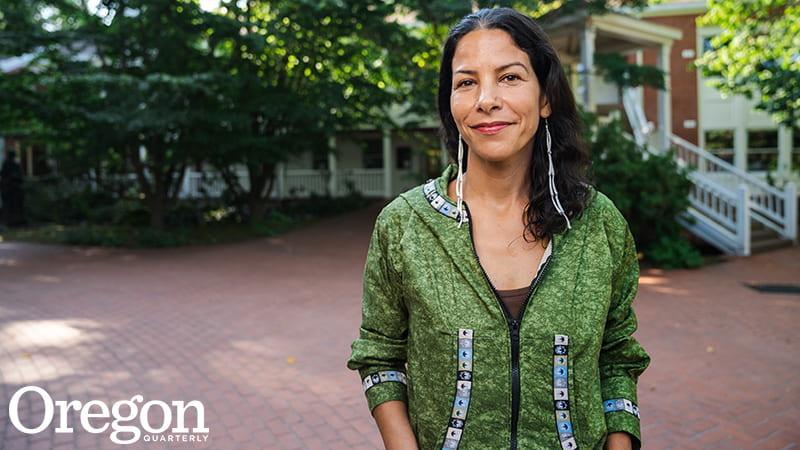
From Fall 2022 Oregon Quarterly—Indigenous students deserve Indigenous teachers.
This philosophy drives the University of Oregon Sapsik'wałá Education Program, which Leilani Sabzalian, of the Alutiiq people of southcentral Alaska, leads with Professor Michelle Jacob, of the Yakama Nation in Washington state. In a collaboration between the nine federally recognized Tribal Nations in Oregon and the College of Education UOTeach master’s program, Indigenous students are trained to teach in Indigenous communities (“Sapsik'wałá,” pronounced “sahp-see-kwuh-THLAH,” means “teacher” in Ichishkíin/Sahaptin, a language traditionally spoken along the Columbia River in southern Washington.)
“Our motto is: ‘Education strengthens our people,’” says Sabzalian, an assistant professor of Indigenous studies in education. “We model how to put Indigenous pedagogies and knowledge at the center of teaching. Our students aren’t there to learn just what I think is important—we invite them to turn toward their own communities and ways of life that are full of brilliance.”
One venerable Indigenous pedagogy is storytelling. Sabzalian shared a story herself—of an Indigenous youth in public schools whose absences prompted mischaracterizations of laziness and disinterest by a principal; in fact, the youth was fulfilling ceremonial obligations in their community, a show of maturity that should have been applauded.
“Public schools don’t typically value the knowledge and culture of Indigenous youth,” Sabzalian says. “It’s vital that our students see their knowledge and culture as a source of strength before they become teachers.”
AGE-OLD WISDOM
Another Indigenous pedagogy: learning from Elders.
A new program feature called Grow Your Own prioritizes multigenerational instruction by gathering high schoolers interested in the program with UO undergraduates, master’s students, alumni, and Elders. One revered mentor—Yakama linguist Virginia Beavert, PhD ’12 (linguistics)—turned one hundred last November.
“Having our students in community with an Elder is invaluable,” Sabzalian says. “But those youth perspectives are just as important. They teach us whether what we think is important is actually relevant to them.”
TRIPLE DUCK TURNED TEACHER
Sabzalian’s pathway to becoming a teacher and professor—which she pursued through bachelor’s, master’s, and doctoral programs at the UO—also served as a pathway back to her culture and community.
Though as an adoptee she did not always feel connected to her community, her engagement with the Indigenous community on campus and Indigenous studies scholarship strengthened those connections, eventually connecting her back to her homeland, the Native Village of Chignik, and her biological mother’s extended family.
Now, she feels blessed to lead a program that helps prepare other Indigenous teachers.
PERSONAL PROJECT, PROFESSIONAL VALUE
Sabzalian is researching her life and the continuing journey to reconnect with her homeland, language, and roots.
“Although it’s a personal project, it has value for the future teachers I work with,” she says. “It takes courage and humility to reconnect with your community. By modeling that, I’m showing there’s always time to go back and talk to your aunties or connect with other relatives. There’s time to learn about your language and homelands and those are sources of power for you.”
—By Matt Cooper, managing editor, Oregon Quarterly
—Photo by Nic Walcott, University Communications

